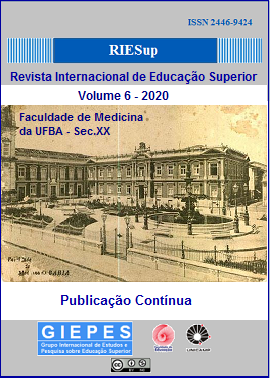Abstract
With the advancement of digital technology, some educational institutions such as schools and universities have rethought their values and teaching practices. A research study was carried out with students from the Federal University of Rio Grande - FURG, a degree in Mathematics, enrolled in the discipline of Applied Technologies to Mathematics Education I. During the course one of the activities the students talked with twelve teachers of public schools, on their pedagogical practice and the presence of digital technologies in the spaces of performance and produced reports, with the aim of understanding the pedagogical accomplishment of Basic Mathematics teachers linked to the use of digital technologies. From the records generated for analysis we used the Discursive Textual Analysis (ATD) in order to understand the phenomenon investigated through the discourses produced. In this study, three categories emerged from ATD: resources used by teachers, perceptions about the use of digital technologies (TD) and challenges in teaching mathematics. From these three categories, it was noticed that the main resources used by the teachers interviewed have been the didactic book and the internet for research of concepts. Among the main perceptions and challenges is the continuing education focused on the use of digital technologies. However, it is necessary to rethink the resources used in the classroom, as well as to create alternatives that meet the needs of the subjects involved and immersed in a technological culture and thus contribute to significant changes in teaching in the current scenario.
References
ABREU, Maristela Dalla Porta de Abreu. Laboratório de Matemática: um espaço para a formação continuada do professor- Dissertação (Mestrado) - Universidade Federal de Santa Maria, Rio Grande do Sul, 1997.
BATES, Tony. Educar na era digital: design, ensino e aprendizagem. São Paulo: Artesanato Educacional, 2016.
BORBA, Marcelo de Carvalho; PENTEADO, Miriam Godoy. Informática e educação matemática. Belo Horizonte: Autêntica, 2001. 98p.
CANAVARRO, Ana Paula. Concepções e práticas de professores de matemática: três estudos de casos.1993. 361f. Dissertação (Mestrado em Educação) - Departamento de Educação da Faculdade de Ciências, Universidade de Lisboa, Lisboa, 1994.
FREITAS, Lidiane Santos de. De imigrante à aprendente digital: A formação de um e-professor. Dissertação de Mestrado. Universidade Federal do Rio Grande. Programa de Pós – Graduação em Educação em Ciências: química da vida e saúde, Rio Grande RS, 2016.
GATTI, Bernadete Angelina. Formação de professores no Brasil: características e problemas. Educação & Sociedade, v. 31, n. 113, 2010.
GAUTÉRIO, Vanda Leci Bueno; RODRIGUES, Sheila Costa. O aprender em ambientes de aprendizagem: Configurando uma cultura escolar. 1. ed. Deutschland: Novas Edições Acadêmicas, 2017. v.1.
KAPLAN, Andreas. HAENLEIN, Michael. Users of the word, unite! The challenges and opportunities of social media, Business Horizons, Vol. 53, Nº1, pp. 59-68, 2010. In. BATES, Tony. Educar na era digital: design, ensino e aprendizagem. São Paulo: Artesanato Educacional, 2016.
KENSKI, Vani Moreira. Tecnologias e Ensino Presencial e a Distância. Campinas, SP: Papirus, 2003.
KENSKI, Vani Moreira. Educação e Tecnologias: O novo ritmo da informação. Campinas, SP: Papirus, 2007.
KENSKI, Vani Moreira. Educação e Internet no Brasil. ResearchGate. University of São Paulo. Disponível em https://www.researchgate.net/publication/281121751_Educacao_e_Internet_no_Brasil. Acesso em: 24 de mai. 2019.
MENDES, Iran Abreu. Matemática e investigação em sala de aula. Tecendo redes cognitivas na aprendizagem. São Paulo: Livraria da Física, 2009.
MORAES, Maria Cândida. O paradigma educacional emergente. Campinas: Papirus, 2012.
MORAES, Roque; GALIAZZI, Maria do Carmo. Análise textual discursiva. Ijuí: Unijuí, 2007.
MORAN, José Manuel; MASETTO, Marcos T; BEHRENS, Marilda Aparecida. Novas tecnologias e mediação pedagógica. Campinas, SP: Papirus, 2014.
PRENSKY, Marc. Digital natives, Digital Immigrants. On the Horizon. Vol. 9, Nº.5, 2001.
PRETTO, Nelson de Luca. O desafio de educar na era digital: educações. Revista Portuguesa de Educação, Minho, v.24, n. 1, 2011. p. 95 -118.
RAMAL, Andrea Cecilia. Histórias de gente que ensina e aprende. Bauru, SP: EDUSC, 1999.
RIBEIRO, Otacílio José. Educação e novas tecnologias: um olhar para além da técnica. In: COSCARELLI, Carla Viana. RIBEIRO, Ana Elisa. (Org.). Letramento digital: aspectos sociais e possibilidades pedagógicas. 3º ed. Belo Horizonte: Ceale: Autêntica, 2005. p.86 -97.
VIANA, Maria. Sou Educador: ensino fundamental II.1.ed.- São Paulo: Eureka, 2016.

This work is licensed under a Creative Commons Attribution 4.0 International License.
Copyright (c) 2019 Raquel Silveira da Silva, Tanise Paula Novello


